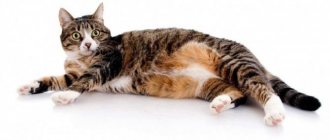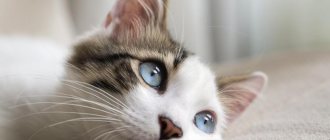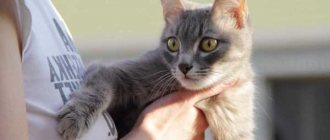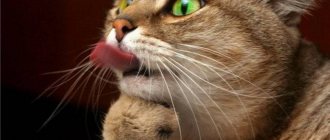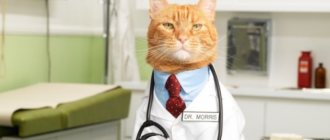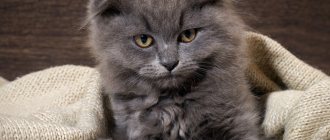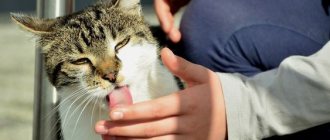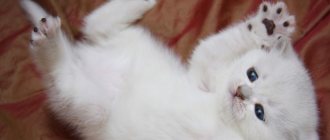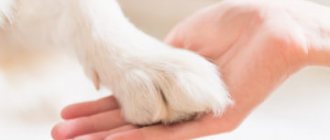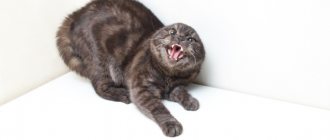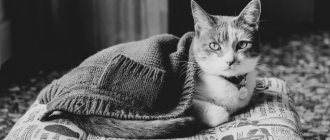8064Pavel
4
A phenomenon that is perceived from people with hostility, misunderstanding, and sometimes with concern for their health, is perceived with affection from cute pets. When a cat farts, we even want to laugh. But why does a cat fart? Perhaps there is no reason to laugh, but is this a warning to us, the owners, that the animal is not in good health? Or is the problem not so serious that you need to worry about it? Let's look at the reasons why a cat farts. And we will understand how to act and what the cat needs.
Do cats fart?
Increased gas formation occurs as a result of fermentation of food residues in the body. The deviation is caused by the formation of large gas bubbles, difficulties with moving the food bolus, intestinal colic, and an unpleasant odor when cleaning the intestines. Cats fart because the food they eat goes through a complete processing process in the gastrointestinal tract.
Confused cat who got rid of accumulated gases
How to tell if a cat is farting
With flatulence, the animal experiences rumbling sounds in the abdomen; palpation examination shows an increase in the intestinal volume, moderate pain when touched. The pet can sleep peacefully, but when the accumulated gases escape, it suddenly wakes up, jumps on its paws, and meows.
The pathology provokes the development of diarrhea and constant anxiety in the furry pet. If a cat farts, then the problem is related to the inability to fully process the food it eats. Flatulence indicates an incorrect diet or the formation of gastrointestinal diseases.
Good and bad food
The anatomical structure does not provide for increased gas formation due to the short digestive tract. This feature helps the body quickly absorb nutrients and remove metabolic products. Improper care of your pet leads to cats periodically farting.
For your information! According to statistics, young and older animals are susceptible to similar anomalies. Middle-aged cats suffer from flatulence due to the fault of their owners.
Flatulence in cats
Active formation of gases may be associated with air entering the stomach during rapid absorption of food, or with diseases of the digestive tract. The accumulation of fermentation products causes flatulence and belching, causing even a small kitten to fart.
Deformation of the intestinal walls under the influence of gases provokes attacks of vomiting, diarrhea, and cramps. The manifestations are dangerous for pets, but the situation worsens with repeated meals. Stopping the normal processes of processing the food bolus leads to its accumulation in the gastrointestinal tract and rotting. A large amount of unprocessed residues causes general intoxication of the body and a putrid odor.
Symptomatic treatment
To find out exactly the cause of flatulence, you need to show your cat to a veterinarian. The specialist may prescribe a number of examinations. Most often this is:
- blood chemistry;
- stool analysis for eggworm and intestinal infections;
- stool analysis for dysbacteriosis;
- Ultrasound and radiography of the digestive organs.
When the cause of the gas is determined, the doctor will prescribe treatment. It is important to strictly follow the specialist’s recommendations, not to increase the dosage or replace the drug with analogues. Only in this case, the positive effect of treatment will not be long in coming.
Treatment is carried out depending on the cause of the pathology. These can be anthelmintics, antibiotics and antimycotics. In case of formation of ulcers and neoplasms, or intestinal obstruction, surgery may be indicated. In mild cases, veterinarians prescribe drugs that regulate intestinal microflora and carminative drugs. If necessary, a gas tube can be inserted.
It is also worth reviewing the cat's menu. You need to feed her in small portions, fresh food. Correctly plan your pet’s diet or feed it with ready-made balanced food. Eliminate milk, bread and spices from your diet. Cats must receive meat, but not fat or chicken (duck) skin. If gas formation is excessive and causes anxiety for your pet, you can give him enterosorbent in a children's dosage or simethicone preparations (Simethicone, Espumisan).
Main causes of gas
Why do cats sleep a lot: the main reasons and is it normal?
Cats fart for a reason; the problem is caused by improper feeding, accumulation of hair in the gastrointestinal tract, helminths and other sources. When a pathology appears, the owner needs to check why the cat is experiencing flatulence.
Dangerous foods for pets
Poor nutrition
Most often, a cat repeatedly spoils the air due to an incorrectly selected diet containing large amounts of carbohydrates. Food enriched with them lingers in the intestinal tract and begins to rot, causing poisoning. Feeding from a common table leads to the fact that animals begin to fart constantly.
Important! Many careless owners sincerely believe that spoiled food does not harm the cat’s body. Rotten feed irritates the mucous membranes of the gastrointestinal tract, causing intoxication, vomiting, diarrhea and flatulence.
Cats love milk, but the effects on their stomach after drinking it are not very pleasant.
Veterinarians have compiled a list of reasons why cats fart.
- Bakery products. Feeding pieces of a bun or cake leads to fermentation processes in the intestinal tract. Yeast and carbohydrates are harmful to pets; constant feeding with sweet buns over time provokes inflammatory processes in the gastrointestinal tract.
- Milk products. The usefulness of milk, sour cream and kefir for adult animals is questionable. The body of a mature individual does not produce special enzymes that help digest these products. Active feeding with dairy and fermented milk products becomes a source of lactose intolerance. One saucer of milk sometimes leads to prolonged, two-month therapy for the affected animal.
- Fish products. The second common misconception is the recommendation to constantly feed fish. The carnivorous nature of cats requires meat, and fish products are allowed on the menu no more than once a week. An excess can lead to the formation of kidney stones, especially in males, digestive disorders, and increased gas formation.
- Spices. Spices, garlic and onions are among the enemies of the gastrointestinal tract of furry pets. They cause gastritis, colitis and other inflammatory phenomena of the gastrointestinal mucosa. The misconception about the benefits of spicy vegetables in the fight against worms and colds comes from rural areas, where these pathologies predominate among the population.
- Fat and meat trimmings. Attempts to feed the animal with cartilage, fat and fascia are successful. The predominance of these “delicacies” causes indigestion, problems with liver function, flatulence, and diarrhea. Constant feeding of junk food will result in chronic diseases of the digestive system.
- Cereals. The omnivorous nature of cats is one of the common myths. The unfortunate hungry animal is forced to eat the soy, wheat and corn products offered. They are a source of increased gas formation and disturbances in the gastrointestinal tract.
Do domestic cats fart on expired food? Spoiled food and meat with a characteristic odor initially cause flatulence. The consequences of such a diet include intoxication, serious diseases, and helminths.
Balls of wool
Ignoring the need for constant care for pets, especially long-haired breeds, leads to the accumulation of hairballs in the intestinal tract. They interfere with the digestive processes, leading to stagnation of the food bolus, its rotting and fermentation. Not all individuals have a well-developed gag reflex, which allows them to regurgitate trichobezoars - dense balls of compressed hair that stretch the intestines, causing diarrhea, vomiting, and flatulence.
Vomiting in a cat is a sign of many ailments
Intestinal parasites
If your cat farts repeatedly, the problem may be intestinal parasites. Worms are localized in the small intestine and cause irritation of its mucous membranes and allergic reactions. A large accumulation of helminths leads to blockage of the lumen of the gastrointestinal tract and bile ducts. With parasites, a cat experiences not only increased gas formation, but also constipation.
But there are other sources of flatulence.
- Allergic reactions. Individual intolerance to certain foods causes allergy outbreaks. Pathology is associated with a variety of products, but more often it occurs due to milk sugars, gluten, and artificial components in finished feeds. Cheap varieties contain ingredients that make the animal want to eat them constantly. As a result, it suffers from gas, colic, and pain in the gastrointestinal tract.
- Viruses. Infection occurs through constant visiting of the street. Domestic animals are less likely to become ill with parvovirus compared to free-roaming animals. Average statistical data indicate that every second cat suffers from it due to contact with the outside world.
- Inflammation. The development of pathology is determined by diarrhea, bouts of vomiting, and bad breath. Severe gas formation during the inflammatory process is a secondary symptom. A sick pet requires a visit to the veterinarian and antibiotic treatment.
- Dysbacteriosis. Disturbance of the balance of normal microflora is associated with antibiotic therapy, poor nutrition and subsequent intoxication. The disease provokes disruption of the immune system and flatulence. Do small kittens fart when they have dysbacteriosis? In young animals, the disease is caused by transferring to roughage after mother's milk, from wet to dry food.
- Constipation. A prolonged delay in defecation provokes increased gas formation. An overfilled gastrointestinal tract irritates the pet, and constant discomfort leads to loin riding on the floor and meowing plaintively.
- Impaired functionality of the intestinal system. Pathological inability to process food normally is more common in cats with congenital abnormalities. Other causes of dysfunction include injuries and previous gastrointestinal diseases. Only a veterinarian can determine the source of the disorder after a full diagnostic examination.
- Air entering the stomach. Eager consumption of food leads to belching and gas formation. Increasing the frequency of feeding and reducing the size of portions quickly solves the problem.
Important! If the pet spoils the air regularly, the owner should consult a veterinarian. In some pathologies, ignoring the symptoms can cost him not only his health, but also his life.
Features of the stomach
A cat's stomach is single-chamber. The inside is lined with a mucous membrane that produces gastric juice. There are two openings from the stomach: one opens into the esophagus, and the other opens into the small intestine.
The cat's stomach serves to store food and control the rate at which food enters the intestines and secretes enzymes necessary for the digestion process. Mixing and grinding of food occurs in it. With muscle movements, it directs food into the small intestine.
When food enters the stomach, its bottom relaxes to reduce intragastric pressure. The smell and taste of food causes the secretion of gastric juice. Digested food is sent to the intestines, and its undigested part remains in the stomach. The more caloric a food is, the slower it is digested.
Changing your diet
Skinny cat: signs and main causes of exhaustion
Improper feeding is one of the main sources of indigestion and gas in a cat. A lack or excess amount of food, an incorrectly selected diet, and eating waste from the master’s table provoke gastrointestinal dysfunction. Mature pets are in a subgroup at increased risk for the disease, and their weakened bodies require a sufficient supply of vitamins and minerals.
Note! Good expensive food has a high price, but does not harm animals. They are categorized by age, activity level and body weight. They cannot overfeed or underfeed your furry pet.
Why are cheap options not suitable? They have added foreign components - legumes, soybeans, corn. For a carnivorous predator, they are foreign and are poorly digested in the gastrointestinal tract. Artificial flavor enhancers and other flavorings become a favorable source of proliferation of pathogenic microflora.
You cannot buy food according to your pet’s taste preferences. If earlier he avoided foods that were dangerous to health, now manufacturers manage to lull his vigilance with third-party additives. Inexpensive food is made from components that attract attention and interest the animal. The result of saving is a storm in the stomach due to active fermentation.
Manufacturers of branded mixtures indicate on the packaging the constituent ingredients: proteins, a mixture of poultry, beef, rabbit and other animals, vegetable fats. They do not contain soy, corn and other components that increase the weight of the feed.
Does my cat pass gas after feeding? They can be caused by disruption of the feeding schedule. Three meals a day are allowed; the best option is morning breakfast and evening dinner. If an animal has access to food all day, overeating results in flatulence and other unpleasant symptoms.
Important! A hungry pet is not able to patiently wait for the time when a careless owner remembers his responsibilities. He starts looking for food in trash cans, on the table, and tries to escape into the street. This behavior is not the result of curiosity, but a problem that leads to serious illness.
Hungry cats often look in the trash
What to do and how to help your pet
If the flatulence is “mild”, then before the cause is determined and examined by a doctor, you can apply:
- Enterosgel - ½ teaspoon an hour before or an hour after feeding.
- Activated carbon - ¼ tablet 2 times a day.
The course of treatment lasts 5-6 days. If it is not possible to see a doctor, and in addition to flatulence there is a pain reaction, then you can ask:
- Baralgin;
- Spasmadol;
- Antipyrine.
Flatulence is not a disease, but only one of many symptoms. To establish a diagnosis and prescribe treatment, it is necessary to examine the animal.
Physical exercise
The health of not only humans, but also their pets depends on physical activity. Veterinarians recommend visiting a pet store and purchasing special devices that help cats diversify their dull pastime indoors.
The climbing structure is safe; individual models can be rebuilt according to the principle of a children's construction set. It will keep your pet occupied for many hours, will increase its agility, strength, and relieve excess weight.
Toys - mice, balls, bags of catnip - will allow the animal to realize its hunting instincts. Chasing the elusive ball will arouse interest and improve the functioning of internal organs. You should not purchase toys from dubious places; toys made from toxic substances or poorly processed with sharp seams can cause serious damage to health.
Every cat should have its own toys
Important! In the absence of free material resources, you can use tennis balls, golf balls, and ping pong balls as a simulator. The owner must be able to determine the appropriate size devices: the cat can swallow toys that are too small, or they will accidentally fall into the windpipe.
How do gases form in the intestines of animals, does this happen in cats?
Gas is a byproduct of digestion. They are formed in the intestines of every animal and are the result of the vital activity of bacteria in the intestines. During the digestion of food, microorganisms secrete enzymes that convert the substances absorbed from it into vitamins and other components necessary for the body.
In the process of breaking down food by anaerobic bacteria, a certain amount of gases is formed, which are partially absorbed by them and partially remain in the intestines. If the animal’s body functions without failures, a small amount is absorbed into the bloodstream, while most leaves the body through the rectum.
These substances consist of:
- oxygen;
- nitrogen;
- carbon dioxide;
- hydrogen;
- a small amount of methane.
The components of intestinal gases are odorless. It appears due to substances containing sulfur, which are secreted by bacteria that live in the large intestine. Cats, like any other animal, produce gases in their bodies.
When to go to the vet
If your cat farts frequently and there is an unpleasant odor from the gases, then this is a good reason to visit the veterinary clinic. Self-medication in this case will do more harm than good. Without diagnostics and tests, it is difficult to determine the source of dysfunction and select medications.
Veterinarians advise not to ignore flatulence in pets: it is better to be safe than to carry out long-term therapy for a sick pet. If a cat farts once, then this is a normal reaction of her body; with prolonged gas formation, professional help is needed.
Prevention of flatulence
The prevention of flatulence will be rational and timely feeding of low-volume, easily digestible feed.
You should not allow greedy eating of food. The animal should not beg for food, it should be provided regularly. The food should be fresh, with a pleasant organoleptic feel, desirable for the animal. If feeding is carried out with canned food, you should carefully study the expiration dates and storage conditions. To avoid viral enteritis, animals should be vaccinated promptly and regularly.
To prevent helminthic infestation, you need to make it a rule to give complex anthelmintics quarterly. Particular attention is paid to the prevention of viral diseases and helminthic infestations if the cat has free range and contact with other animals.
WHY
Scientists have discovered farting fish
If it seems strange that serious scientists in Scotland are publishing a study on herring farts, what about the fact that they were practically outdone by Swedish scientists who discovered the same phenomenon? This is what great minds do. Bob Batty of the Scottish Association of Ocean Sciences was quite surprised when, together with two researchers from Canada - Ben Wilson and Larry Dill - he made this discovery.
We suggest you read: Preventive rabies vaccination for pets. Rabies vaccines for cats and dogs.
Thanks to him, they received the “Ig Nobel Prize” (a humorous imitation of the Nobel Prize) for incredible things in biology. The Ig Nobel laureates' tour of the UK begins today, and Betty and Wilson will take part in it. Dr Batty, who works at an ocean science center near Oban, and his colleagues were studying whether herring could recognize the sounds made by predators, as whales and dolphins can do.
Using infrared lighting, video cameras and underwater microphones, they studied the herring's behavior throughout the day. “We heard these rattling sounds, which only happened at night, whenever we saw tiny gas bubbles appearing near the tail of the fish,” says Batty. “We also found that the fish released more bubbles the more they were near them. other fish.
In other words, they like to fart in company,” says Wilson. As Betty explains, after analyzing the gas bubbles using chromatography, they determined that it was air that the herring had captured from the surface - this had nothing to do with intestinal bloating. He believes that for herrings, farting is a way of nocturnal communication and a way to maintain the integrity of the school.
During the daytime, they exchange visual information, for example, by reflecting light from mirrored scales. Herring and its relatives release bubbles of gas when they are attacked, but the activity discovered by Dr. Batty and his colleagues serves a slightly different purpose. To the average person, this discovery seems to add little to scientific knowledge, but it is not useless.
As Dr. Batty points out, in sonar surveys, oceanographers who are trying to determine the number and size of fish detect air bubbles, so information about when and how much air is released is of interest to them. Why did the farting herring interest the Swedes? Swedish navy sailors heard strange noises of unknown origin and feared they might be coming from a Russian submarine, so they asked scientists to investigate.
We suggest you read: The cat is hiding: what to do? And why do cats hide in shelters?
As a result, another scientific work appeared, confirming that the herring of the Baltic Sea is no better, it also behaves indecently.
Why does the kitten fart so much?
A small amount of gas every now and then is standard for most cats, so it may not be too much of a concern if you start noticing your kitty farting from time to time. We've all been there, the kitten doesn't react well to a new food and the litter box has a bit of an extra stench. But if your kitten seems to be constantly farting, it could be much more worrisome. So now you're wondering why does my kitty fart so much?
Your kitten farts so much because she swallows too much air while eating. The air passes through their intestines and turns into gas. Other common problems include dairy-based foods, possible hairballs, or kitten foods that have too much fiber in their diet.
All of these problems can lead to excessive gas, but there are other causes as well.
Why does the kitten fart?
We've already discussed some of the common reasons why kittens fart, but there's another reason worth touching on. If your cat is very young, especially if you rescued her or a cat who is separated from her mother too early, your kitten's farting may be explained by gut flora that is still setting up their digestive system.
Cats typically pass on some of their digestive bacteria during birth, nursing, grooming, and other grooming activities. But young cats may not immediately develop a full digestive flora, which can cause increased flatulence for a while until the right bacteria appear to colonize their intestines. This may be the reason why younger kittens fart frequently.
© shutterstock
However, it is still recommended that you take your kitten to the vet even if you suspect this is the cause of his farting, as your vet can give you some advice on how to support your cat and make sure she is still getting adequate nutrition. nutrition. Your veterinarian can also help rule out other, more problematic causes of excessive gas and farting in kittens.
Clinical picture
Of course, when a cat constantly passes gas, the diagnosis is quite simple. But it’s still worth remembering that there are other clinical signs that directly indicate flatulence:
- Vomit.
- Diarrhea or constipation.
- Rumbling in the stomach, also known as borborygmy. Occurs when intestinal gas bubbles begin to “roll” in the intestines.
- Copious release of gases through the anus. Sometimes the smell is so strong that it is impossible to be in the same room with the animal.
- Muscle spasms causing severe pain. It is impossible to touch the stomach of a sick cat, since the animal reacts to such attempts very inadequately and aggressively.
In addition, the stomach of a sick pet noticeably swells and feels like a drum . The muscles become very tense. The cat cannot lie or sit quietly, constantly fidgets, and sometimes howls in pain. A pet in this state refuses food, and thirst may persist.
